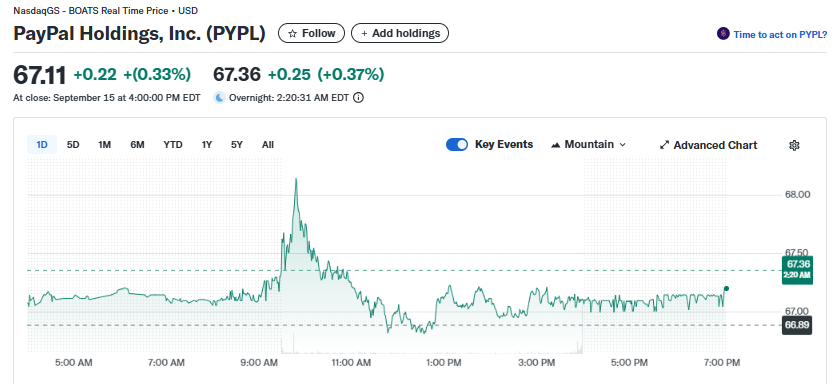TLDRs;
- PayPal launched one-time personalized payment links in the U.S., with international expansion planned this month.
- Links are private, single-use, and expire after 10 days, adding a new layer of payment security.
- PayPal plans to integrate Bitcoin and Ethereum transfers into its peer-to-peer ecosystem in the U.S.
- Despite innovation, PYPL stock remains subdued as investors wait for clear revenue impacts.
PayPal Holdings, Inc. (NASDAQ: PYPL) ticked slightly higher on Monday, closing at $67.11 (+0.33%) and climbing further to $67.36 (+0.37%) in overnight trading.
The muted but positive movement coincided with the company’s announcement of personalized one-time payment links, a new feature aimed at making peer-to-peer (P2P) transactions faster and more secure.
The launch underscores PayPal’s ongoing strategy to enhance digital payments while building toward deeper cryptocurrency integration.

PayPal Links Debut in the U.S.
The new PayPal Links feature allows users to create private, single-use payment links that can be shared through text or email.
Once received, the recipient can complete the transaction directly within the PayPal app. These links are designed with built-in security: they expire after 10 days if unclaimed, reducing fraud risks.
Currently available in the U.S., the service will expand to the UK, Italy, and other international markets later this month, signaling PayPal’s ambition to scale its innovations globally.
Launching today: PayPal links 🚀
Send and receive money as easily as sending a message–just share a one-time link by text, DM, or email.
Live now in the US, and more markets soon.
Coming next: crypto support for peer-to-peer via the PayPal app—including Bitcoin, Ethereum,… pic.twitter.com/H3ZDGUBGiS
— PayPal (@PayPal) September 15, 2025
Crypto Integration Coming Soon
Perhaps more notable is PayPal’s planned integration of cryptocurrencies into its P2P payment flow. U.S. users will soon be able to send assets such as Bitcoin and Ethereum across PayPal, Venmo, and compatible third-party wallets.
This marks another milestone in PayPal’s steady march into the digital asset economy. Since its first crypto initiative in 2020, the company has layered products carefully, including the launch of its PYUSD stablecoin in 2023 and its “Pay with Crypto” tool unveiled earlier this year.
With PYUSD now among the top 15 stablecoins by market capitalization, PayPal has built both regulatory credibility and infrastructure needed to compete with dedicated crypto-native platforms.
A Methodical Approach to Digital Assets
PayPal’s approach to cryptocurrency has been deliberate, unlike startups that race toward quick adoption. The company signaled early interest in 2016 by adding Xapo founder Wences Casares to its board, then reinforced its strategy with a 2019 investment in Cambridge Blockchain.
That same year, it distanced itself from Facebook’s troubled Libra project, highlighting its cautious stance on regulation. In 2023, PayPal launched its PYUSD stablecoin, followed in 2025 by the “Pay with Crypto” feature, which converts coins into PYUSD for merchant payments.
With the addition of personalized links and crypto transfers, PayPal is now shaping an ecosystem where traditional and digital currencies operate side by side.
Market Outlook for PYPL
Despite these announcements, PayPal’s stock reaction has been restrained. Shares remain in the mid-$60 range, far below their pandemic-era highs above $300. Analysts suggest that while innovation is ongoing, investors want to see tangible revenue growth from new features before rewarding the stock with a sustained rally.
Still, the introduction of private links and crypto functionality could provide a new growth engine, especially as consumer preferences shift toward digital-first payment solutions.








